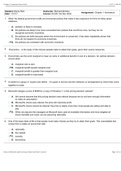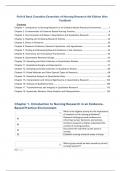Essay
Edexcel Religious Studies AS/A-Level - Unit 3 Problems of Evil and Suffering
- Institution
- PEARSON (PEARSON)
This essay covers unit 3 of the Edexcel Religious Studies specification - the Problems of Evil and Suffering. It is used in Section C of Paper 1 (Question 4), includes a synoptic link, and can be tailored to earlier questions of the paper. The first part of the essay defines the debate in unit 3.2,...
[Show more]






